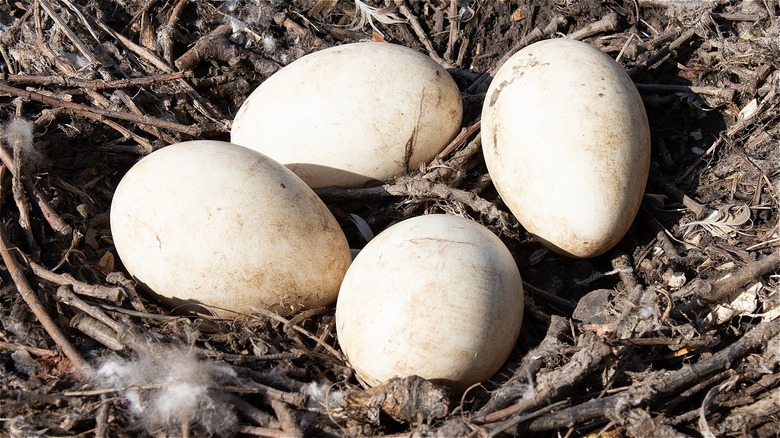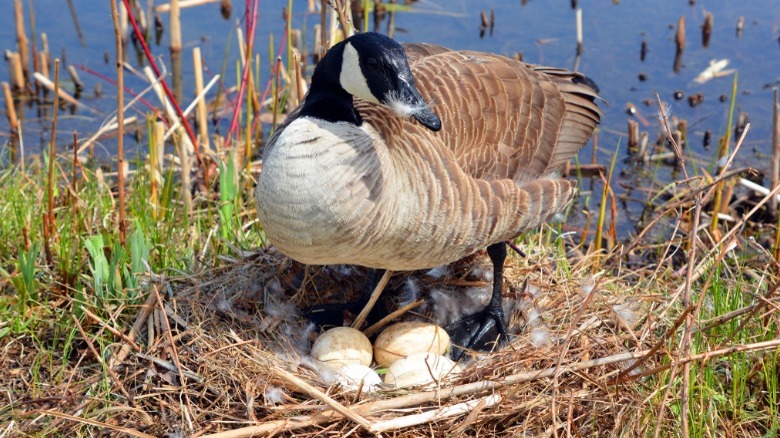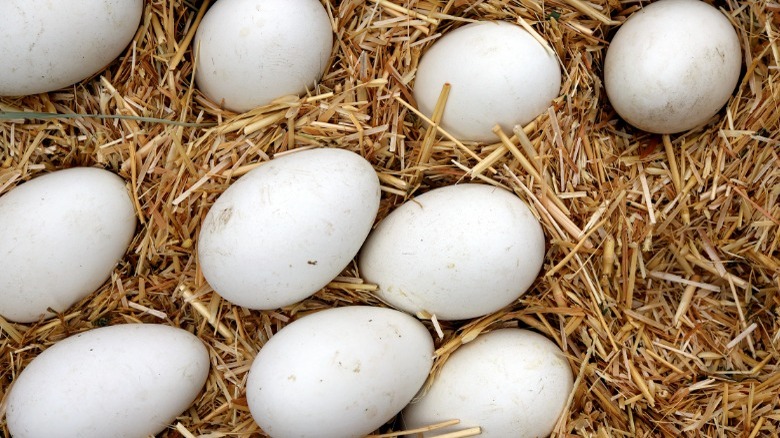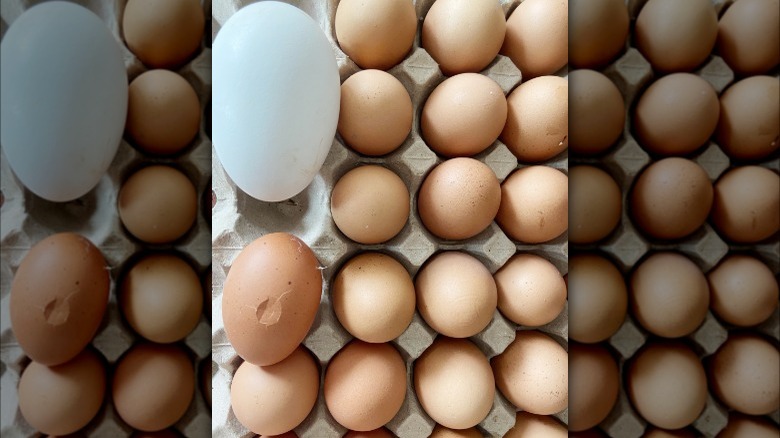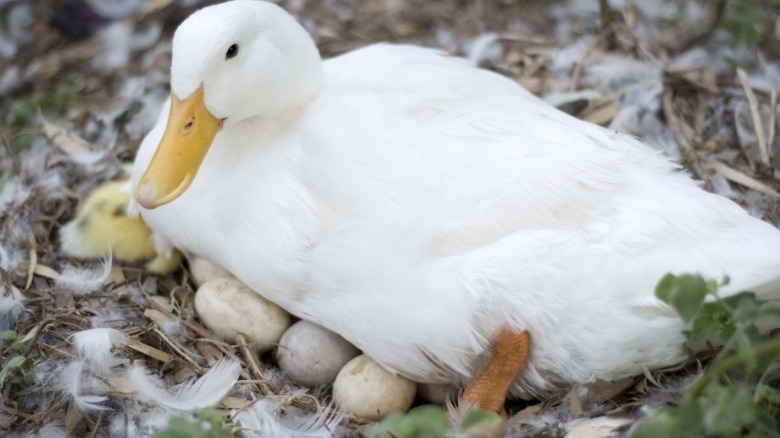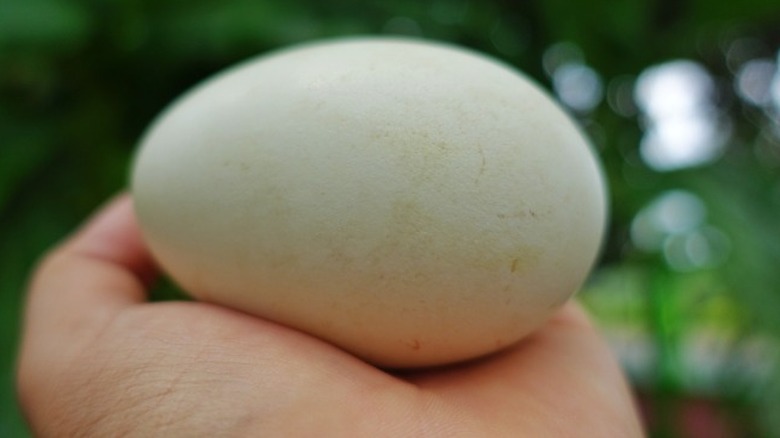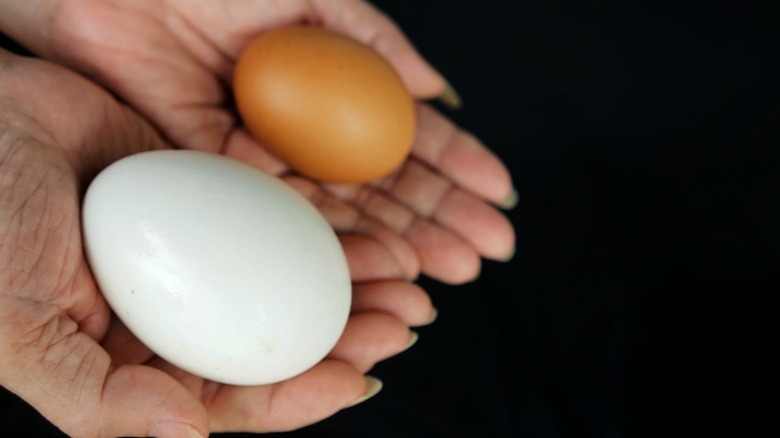Can You Eat Goose Eggs?
Eggs are called the "perfect protein," and if you're looking to branch out from the chicken variety, you'll be happy to know that what's good for the goose is good for the gander. That's right, you can swap out chicken eggs for goose eggs in a lot of culinary scenarios, according to Hobby Farms. The main difference between the two varieties is their size and shell thickness. Goose eggs are much larger than chicken eggs — three times larger — and you'll need to use greater force to crack their sturdy white shells. Once you do, you'll notice a deep orangey yolk.
Geese are raised in pastures, where they peck away at a balanced variety of different food sources, The Spruce Eats reported. This gives their eggs a more powerful, eggy flavor than what you might be used to from a chicken egg. And they're harder to find than chicken eggs. That's because geese lay a finite number of eggs every year, which drives up their price tag.
How are goose eggs harvested?
While most chickens lay many eggs throughout the year, geese typically lay eggs just once per year, primarily in the spring, according to the Department of Primary Industries. These birds are prolific foragers, and most of what they eat — plants and other vegetation — come straight from the ground, per Backyard Poultry. In fact, many farmers opt to deploy a flock of geese to keep pastures free of weeds. One acre of land is enough to support 20 to 40 geese, and the eggs sweeten the deal even more, Maine Organic Farmers And Gardeners reported.
However, some breeds of geese make better egg layers than others. Embden Geese are commonly chosen for breeding because of their egg-laying abilities. Chinese geese also make productive egg-layers. After choosing a breed of geese, the hardest part of harvesting goose eggs, Modern Farmer explained, is collecting the eggs after they've been laid. Because geese typically travel with their flocks, farmers watch for any lone goose wandering off on its own, potentially to lay an egg.
What do goose eggs taste like?
There's a reason that people call their big, knobby forehead bruises goose eggs. These large eggs are amplified in every way. Not only are they more intensely colored than chicken eggs, per Mother Earth News, they're higher in fat, flavor, and richness. They're also more yolk than white, which makes them ideal for adding moisture and density to baked items. Plus, some connoisseurs say goose eggs have a distinct, gamey flavor.
NPR performed a blind taste test of several varieties of hard boiled eggs, including goose eggs, and the participants reported they were the least tasty of the bunch. While duck eggs were deemed, "creamy," and "really good," the group described goose eggs as having a "dense yolk," and said their flavor was "weird" and "funky." Chicken and duck eggs were the most popular, but the difference between duck and chicken eggs is the cost of feeding them.
Cooking with goose eggs
Goose eggs may not be the favorite when it comes to flavor in their most basic form, per NPR, but they can bring something new to your baking game. Sure, you can boil, fry, poach or scramble them as you would any egg, but, according to Mother Earth News, goose eggs are ideal for adding moisture to baked items. That's because they are more yolk than white. If you opt for goose eggs, your batter will be more dense than it would be if you used chicken eggs. If you need to course correct, or you prefer something lighter, simply add the white of a chicken egg, The Spruce Eats advises.
Goose eggs are considered a secret weapon among pasta makers, as well. Many pasta recipes that are dangerously delicious are made with goose eggs instead of chicken eggs. The enormous yolk provides intense flavor, and the texture of the pasta turns out springy because the egg white has a high protein content.
When you get around to cracking your goose eggs, be prepared to exert some brute force. But, you have to be careful, because this necessary effort increases the chances that you'll break the yolk, The Spruce Eats explains.
Goose eggs vs. duck eggs
While both goose and duck eggs are larger than the chicken eggs we see on shelves every day, goose eggs are a lot harder to find, per Fruit of Levine, LLC. That's because geese are seasonal egg layers, and they don't lay as many eggs as ducks or chickens — making them a somewhat rare and treasured find. But duck eggs have more protein and other vitamins and minerals than goose eggs, and they're considered healthier.
You should be using duck eggs for baking because they produce a lighter result. Duck eggs are also particularly well-suited for baking gluten-free items. That's because their high protein content adheres the ingredients together and results in a fluffier final product. Goose egg shells are much tougher than duck eggs, according to Cackle Hatchery, which also notes that cracking the shell of a goose egg requires about 18 pounds of pressure.
Where to buy goose eggs
If you've never eaten a goose egg, there's probably a reason for that. They're difficult to find because geese lay a finite number of eggs usually only once per year, according to The Spruce Eats. Because goose eggs aren't a common ingredient, you won't likely see them with the chicken and quail eggs found at your local grocery store. Sometimes, stores like Whole Foods will stock duck eggs, but it's not a sure bet.
Goose eggs are more often found at farmers' markets and are independently sold by farms. Prices can run quite high for this egg, which you'll likely have to order online. You can get two dozen goose eggs from Exotic Meat Market, which boasts all of the health benefits included in the product, for $480. Silver Valley Farms will sell you six eggs for $90. From other sources, like C & D Family Farms, you can buy eggs individually for $4 per egg.
Nutrition of goose eggs
If you're preparing to whip up some seriously delicious egg recipes using goose eggs, you're in for a meal that's jammed with rich flavor and nutrition. Goose eggs are not only full of culinary possibilities, but they're also packed with healthy perks, LiveStrong reported. Yes, they have more cholesterol and calories than chicken eggs — about 266 calories per egg — but they contain more vitamins, minerals, and protein, as well as a lot of healthy fats.
For example, goose eggs have 19.5 grams of protein, 20 grams of fat, and 312% of the daily recommended amount of vitamin B12, according to The Healthy Home Economist. Chicken eggs contain 6 grams of protein, 4.8 grams of fat, and 7% of the daily recommended B12 value.
A goose that eats a healthy diet of green plants and bugs will lay more nutritious eggs, per Fruit of Levine, LLC, noting that they will have less cholesterol and saturated fats, and more vitamins A, E, and D, and beta carotene.
